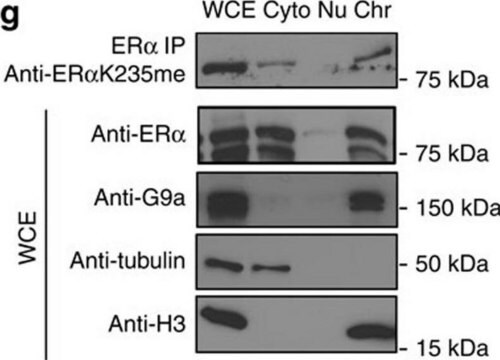SAB4200105
Anti-PKM2 (C-terminal) antibody produced in rabbit
~1.5 mg/mL, affinity isolated antibody
Synonyme(s) :
Anti-CTHBP, Anti-OIP3 (OPA-interacting protein 3), Anti-PK3, Anti-PKM, Anti-Pyruvate Kinase, MUSCLE (isoform M1), Anti-TCB, Anti-THBP1 (thyroid hormone-binding protein, cytosolic)
About This Item
Produits recommandés
Source biologique
rabbit
Conjugué
unconjugated
Forme d'anticorps
affinity isolated antibody
Type de produit anticorps
primary antibodies
Clone
polyclonal
Forme
buffered aqueous glycerol solution
Poids mol.
~60 kDa
Espèces réactives
rat, human, mouse
Concentration
~1.5 mg/mL
Technique(s)
immunoprecipitation (IP): 2-4 μg using A549 cell lysates
indirect immunofluorescence: 2-4 μg using HeLa cells
western blot: 1-2 μg/mL using L8 and C2C12 cell lysates
Conditions d'expédition
dry ice
Température de stockage
−20°C
Modification post-traductionnelle de la cible
unmodified
Informations sur le gène
human ... PKM2(5315)
mouse ... Pkm2(18746)
rat ... Pkm(25630)
Description générale
Spécificité
Application
Actions biochimiques/physiologiques
Forme physique
Clause de non-responsabilité
Vous ne trouvez pas le bon produit ?
Essayez notre Outil de sélection de produits.
Code de la classe de stockage
10 - Combustible liquids
Point d'éclair (°F)
Not applicable
Point d'éclair (°C)
Not applicable
Certificats d'analyse (COA)
Recherchez un Certificats d'analyse (COA) en saisissant le numéro de lot du produit. Les numéros de lot figurent sur l'étiquette du produit après les mots "Lot" ou "Batch".
Déjà en possession de ce produit ?
Retrouvez la documentation relative aux produits que vous avez récemment achetés dans la Bibliothèque de documents.
Articles
We presents an article about the Warburg effect, and how it is the enhanced conversion of glucose to lactate observed in tumor cells, even in the presence of normal levels of oxygen. Otto Heinrich Warburg demonstrated in 1924 that cancer cells show an increased dependence on glycolysis to meet their energy needs, regardless of whether they were well-oxygenated or not.
Notre équipe de scientifiques dispose d'une expérience dans tous les secteurs de la recherche, notamment en sciences de la vie, science des matériaux, synthèse chimique, chromatographie, analyse et dans de nombreux autres domaines..
Contacter notre Service technique